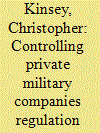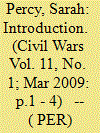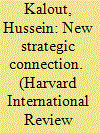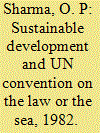| Srl | Item |
| 1 |
ID:
062634


|
|
|
| 2 |
ID:
086350


|
|
|
|
|
| Summary/Abstract |
Civil wars are,by their very nature, often characterised by the participation of non-state actors.Because civil wars often occur in situations where the state's authority is weak or non-existent, external actors of all types can play both indirect and direct roles.This special issue seeks to examine these two types of actors combined: What happens when non-state actors external to conflicts paricipate in civil wars?Have new actors of this type appeared on the internationl stage?
|
|
|
|
|
|
|
|
|
|
|
|
|
|
|
|
| 3 |
ID:
154430


|
|
|
|
|
| Summary/Abstract |
This article explores the Asia–Europe Parliamentary Partnership (ASEP), which is the parliamentary dimension of the Asia–Europe Meeting (ASEM), from the perspective of the National Diet of Japan. ASEP brings together Japan’s key neighbours and trade partners, including the European Union, its so-called natural partner with whom it shares common values. This article argues that the Japanese Diet members perform a three-level norm promotion process at ASEP. First, they promote the norms and agenda of the Japanese government and thus their activity mirrors Japan’s policies on EU, ASEM and global issues. Even the same challenges, for example the untapped partnership with Europe, are visible. Second, they drive their own personal or party agendas, demonstrating that parliamentarians are not merely mouthpieces of the government but bring plurality and even dissonance to Japan’s message. Third, they promote parliamentary empowerment and participation in international affairs, norms that facilitate the Diet Members’ ability to oversee the Asia–Europe agenda as well as empower other participating parliaments. By taking the perspective of one country, this article provides insights to the little known workings of the Asia–Europe Parliamentary Partnership.
|
|
|
|
|
|
|
|
|
|
|
|
|
|
|
|
| 4 |
ID:
129189


|
|
|
|
|
| Publication |
2014.
|
| Summary/Abstract |
Keen to establish itself as an actor with greater importance in global geopolitics, today's Brazil seeks a foreign policy in accordance with its present stature and aspirations. The country has emerged from the periphery of the international order to become a global player with an enhanced voice on the international stage, eager to ascend to the epicenter of the most powerful nations, and with some degree of influence upon the global system.
|
|
|
|
|
|
|
|
|
|
|
|
|
|
|
|
| 5 |
ID:
133699


|
|
|
|
|
| Publication |
2014.
|
| Summary/Abstract |
United Nations Conference on Environment & Development (UNCED), Rio de Janeiro, 1992 In 1992, five years after the publication of the Brundtland Report, the United Nations Conference on Environment & Development (UNCED), known as the Earth Summit, took place in Rio de Janeiro, Brazil, between 3 and 14 June 1992. The Rio Summit brought together 182 world leaders - delegates from UN agencies and international organisations as well as world media and hundreds of Non- government organisations, to build upon the 1972 Stockholm conference and the 1987 Brundtland Report, and propelled sustainability on to the international stage. The Brundtland concept of sustainable development was universally endorsed at the 1992 United Nations Conference on Environment & Development (UNCED). The concept as elaborated by UNCED represents a new paradigm, a new mode of thinking to serve as a guide to action. Achieving sustainable development involves a process of decision- making in which certain questions are asked and appropriate choices and decisions made. Thus, there is never an end-state of sustainable development but a process that constantly tries to harmonise the needs of development with the maintenance of integrity of the Third United Nations Conference on the Law of the Sea for all the Sessions of the Conference between 1975 and 1982.
|
|
|
|
|
|
|
|
|
|
|
|
|
|
|
|
| 6 |
ID:
163481


|
|
|
|
|
| Summary/Abstract |
Nearly two decades into America’s War on Terror, policymakers remain perplexed about how to navigate the United States’ relationship with Pakistan, an ostensible ally that has long been accused of offering tepid support or creating outright impediments to American counterterrorism operations.
|
|
|
|
|
|
|
|
|
|
|
|
|
|
|
|